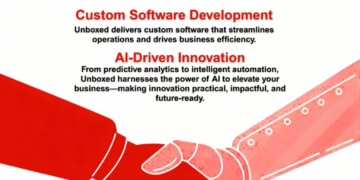The software development landscape is evolving faster than ever. As businesses increasingly rely on digital solutions to drive efficiency, innovation, and scalability, custom software development services are playing a pivotal role in shaping digital transformation. From AI-driven automation to cloud-native architectures, the industry is witnessing groundbreaking trends that are redefining how software is built, deployed, and maintained.
Let’s explore the top trends shaping the future of custom software development services and how they’re transforming the way businesses operate in 2025 and beyond.
1. Artificial Intelligence and Machine Learning Integration
AI and ML are no longer just buzzwords—they’re integral components of modern software development. Companies are embedding AI algorithms into their custom applications to automate tasks, analyze data in real time, and enhance decision-making.
From predictive analytics in healthcare to AI-driven chatbots in eCommerce, these technologies are enabling smarter, data-driven experiences. In software development itself, AI-powered tools assist in code generation, bug detection, and project estimation, improving productivity and accuracy.
2. Low-Code and No-Code Development Platforms
The rise of low-code and no-code platforms has democratized software creation. These tools enable faster prototyping and deployment, allowing businesses to respond to market changes quickly.
For software development companies, the trend doesn’t replace traditional coding—it complements it by accelerating delivery timelines and empowering non-technical users to participate in the creation process.
3. Cloud-Native and Serverless Architectures
The future of software is cloud-native. Businesses are shifting away from monolithic systems toward microservices and serverless architectures, which provide scalability, flexibility, and cost efficiency.
Custom software development teams now design solutions that are containerized (using Docker and Kubernetes) and optimized for cloud platforms like AWS, Azure, and Google Cloud. This approach enhances agility and ensures seamless scalability as businesses grow.
4. Focus on Cybersecurity and Data Privacy
As digital transformation accelerates, cybersecurity becomes a top priority. Data breaches and cyberattacks can cost companies millions, both financially and reputationally.
Modern software development emphasizes “security by design”, integrating advanced encryption, identity management, and compliance standards such as HIPAA, GDPR, and ISO 27001. In 2025, secure development lifecycles (SDLC) and automated threat detection tools are essential for every software project.
5. Rise of Edge Computing
While cloud computing remains dominant, edge computing is gaining traction as businesses process data closer to its source. This reduces latency and improves performance, especially in IoT and real-time analytics applications.
For industries like healthcare, logistics, and manufacturing, custom software that leverages edge technology ensures faster response times and improved operational efficiency.
6. DevOps and Continuous Integration/Delivery (CI/CD)
The DevOps culture has become a standard in custom software development. It bridges the gap between development and operations, enabling faster releases, better collaboration, and higher quality output.
With CI/CD pipelines, developers can automate testing, deployment, and monitoring—ensuring that updates roll out smoothly and efficiently. This trend supports business agility and continuous improvement.
7. AI-Powered Testing and Quality Assurance
Software testing is being transformed by AI-driven tools that can detect bugs, predict failures, and improve software reliability.
Automated testing frameworks powered by AI enhance test coverage and speed, ensuring fewer human errors and faster time to market. As a result, QA teams can focus on strategic tasks like usability and performance optimization.
8. Cross-Platform Development
Businesses today seek solutions that work seamlessly across platforms. Frameworks like Flutter, React Native, and Xamarin have made cross-platform development more efficient, reducing costs and development time while maintaining native-like performance.
This trend allows companies to reach wider audiences across web, Android, and iOS using a single codebase.
9. Blockchain Integration Beyond Finance
While blockchain began in finance, its use has expanded to supply chain management, healthcare, and data security.
Custom software solutions leveraging blockchain ensure transparency, traceability, and data integrity. From smart contracts to decentralized identity management, the technology is driving innovation in enterprise solutions.
10. Sustainability and Green Software Development
Sustainability is now a software priority. Developers are adopting green coding practices to minimize energy consumption and optimize resource usage.
As awareness grows around digital carbon footprints, companies are choosing eco-friendly cloud services and developing applications that balance performance with environmental responsibility.
Conclusion
The future of custom software development services is dynamic, intelligent, and customer-centric. Businesses that embrace these emerging trends will not only stay competitive but also unlock new opportunities for innovation and growth.
As technology continues to advance, the focus will shift from just building software to creating smarter, sustainable, and scalable digital ecosystems that align with evolving business goals.

















